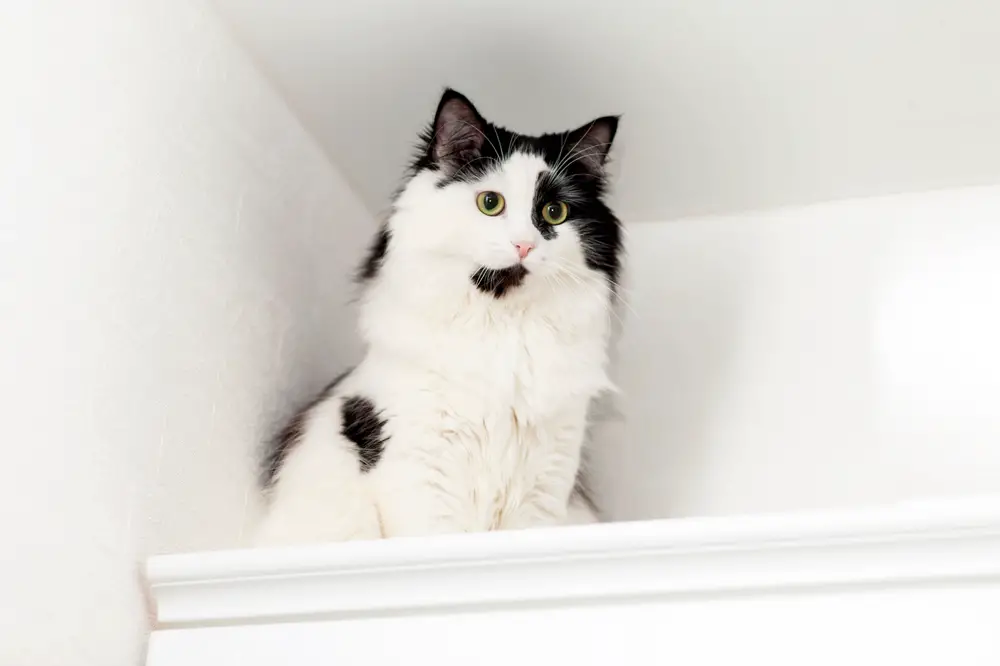There’s a growing body of evidence suggesting that our furry, feathered, and sometimes scaly companions might possess a cunning intelligence that sneaks under our radar. They may not be solving complex algebra equations or composing symphonies, but they have their own distinct brand of genius that often leaves us in awe. Whether it’s their innate ability to sense our moods or their seemingly magical knack for finding the most inconvenient places to take a nap, these behaviors hint at a cognitive sophistication we often overlook. So, let’s dive into the fascinating world of pet smarts and discover the signs that your beloved animal might just be outsmarting you.
1. They Use Their Smarts To Problem-Solve

If your pet can unlock the mysteries of the world, like opening doors, cabinets, or even engaging with puzzles meant for humans, you might have a little Einstein on your hands. Some pets are not just keen observers but also innovative problem solvers. They watch you, learn your patterns, and mimic actions with surprising accuracy. According to Scientific American, animals employ various strategies to overcome obstacles, demonstrating a level of intelligence that rivals our own.
In your absence, they might find ways to navigate through the house, like opening doors that you thought were securely closed. And no, this isn’t a magic trick; it’s raw intelligence. They understand cause and effect and leverage that understanding to get what they want. This capacity to engage with their environment dynamically is a testament to their cognitive prowess.
2. The Pick Up On Human Emotions

Pets have an uncanny ability to pick up on human emotions, often providing comfort and companionship when we need it most. If your pet snuggles closer when you’re sad or celebrates with you during moments of joy, that’s not just a coincidence—it’s empathy. Dogs and cats often mirror our emotions, responding to our tone of voice or body language, and are capable of recognizing and reacting to human emotions in ways that demonstrate a deep, empathetic connection.
This emotional intelligence is particularly pronounced in animals that have lived with us for extended periods. They learn our quirks, anticipate our needs, and respond more acutely to our emotional states. It’s like having a furry therapist who instinctively knows when you need a hug. This keen emotional sensitivity underscores the deep bond shared between humans and their pets.
3. They Can Be Master Manipulators

Does your pet give you “the look” that compels you to drop everything and attend to their needs? If so, they might be a master of manipulation. Pets, especially dogs, have evolved to use facial expressions that elicit responses from humans, a behavior rooted in their domestication history. A study highlighted by the BBC reveals that pets adapt their expressions to manipulate human responses effectively.
This manipulation isn’t random; it’s a calculated move. They understand that certain actions or expressions will get them what they want, whether it’s food, playtime, or simply more attention. Over time, they’ve mastered the art of getting humans to do their bidding with just a tilt of the head or a wag of the tail. It’s a clever strategy that keeps them pampered and cherished by their human companions.
4. They Communicate Without Words

Your pet might not speak your language, but they’ve certainly mastered their own way of communicating. Whether it’s through a series of barks, meows, or other sounds, animals have developed a complex system of communication to express their needs and desires. They use vocalizations, body language, and even subtle gestures to convey messages. As noted by The Smithsonian, animal communication is intricate and varies widely among species.
This ability to communicate effectively with humans and other animals is a sign of their advanced cognitive abilities. They can modify their behavior based on your reactions, adapting their “language” to better interact with you. From the wag of a tail to a specific bark, they’re telling you a story, one that requires a keen understanding and interpretation. Their adeptness at getting their point across is nothing short of impressive.
5. They Have An Internal GPS

Ever wonder how your pet always finds their way home or can locate their favorite toy hidden under the couch? Pets have an extraordinary sense of direction and spatial awareness. Cats, for instance, are known for their remarkable homing instincts, which enable them to return home from great distances. National Geographic explains how animals use a combination of senses, including their internal “GPS,” to navigate through their world.
This navigational prowess is not only impressive but also essential for their survival. In the wild, it helps them locate food, avoid predators, and find their way back to safety. In the comfort of our homes, it means they can still find that squeaky toy buried beneath the couch cushions. Their ability to map out their environment is a sophisticated skill that demonstrates their remarkable intelligence.
6. They Have A Sharp Memory

Your pet’s memory might be sharper than you’d think, especially when it comes to routines and schedules. They seem to know exactly when it’s time for a walk, a meal, or when you typically return home. This isn’t just routine behavior—it’s memory in action. Pets can recall past experiences and use that information to predict future events, showcasing a cognitive depth that parallels human memory in some aspects.
Their memory skills are not limited to just time-based activities. Pets often remember people, places, and even other animals they’ve interacted with. This ability to recall past events and expectations is crucial for their survival and helps them navigate their daily lives with ease. It’s an indicator of their mental acuity, revealing just how intelligent our animal companions can be.
7. They Have Impressive Social Skills

Many pets are incredibly social creatures, adept at reading social cues and understanding the dynamics between different individuals. They can often sense when there’s tension in the room or when a new person poses a threat or is welcome. This social intelligence allows them to navigate complex social environments with grace and ease.
Their social skills aren’t just limited to human interactions. Pets often form intricate social hierarchies with other animals, using their understanding of social structures to gain advantages or coexist peacefully. This level of social awareness requires advanced cognitive skills, highlighting their ability to process and react to social situations in a way that is both strategic and insightful.
8. They’re Adaptive Learners

Pets have an amazing ability to learn and adapt to new situations and environments. They can quickly learn new tricks, commands, or adapt to changes in their living environment, showcasing their flexible intelligence. This adaptability is crucial for their survival and overall well-being, allowing them to thrive in a variety of settings.
Their learning is not just rote memorization but involves a deeper understanding of their surroundings. They observe, process, and implement new information in a way that maximizes their comfort and survival. This ability to learn and adapt is a testament to their intelligence, proving that they are constantly processing and engaging with the world around them.
9. They’re Creative And Resourceful

Have you ever noticed your pet using everyday objects in creative ways? Whether it’s using a box as a makeshift bed or finding a stick to play fetch with, pets often demonstrate a resourcefulness that is truly impressive. This ability to repurpose items and use them to their advantage shows a level of problem-solving that requires both creativity and intelligence.
Their resourcefulness is not just about play; it’s about survival. In the wild, using available resources efficiently can mean the difference between life and death. Even in the comfort of our homes, pets continue to demonstrate this skill, proving that their intelligence is both practical and adaptable.
10. They Have Next-Level Senses

Pets often possess heightened senses that allow them to perceive the world in ways we can’t even imagine. Their keen sense of smell, hearing, or sight allows them to detect changes in their environment quickly and accurately. This sensory awareness is not just a physical trait but a cognitive one, as it requires processing and interpreting vast amounts of information.
This heightened sensory perception gives them an edge in detecting potential threats, finding food, or navigating complex environments. It’s an integral part of their intelligence, highlighting their ability to interact with the world on a level that goes beyond mere instinct. Their sensory capabilities are a testament to their remarkable cognitive and sensory integration.
11. They’re Intuitive Healers

Some pets have a natural inclination to provide comfort and healing to their human companions. Whether it’s curling up next to you when you’re unwell or providing calming company during stressful times, they seem to have an instinctive understanding of when you need support. This behavior indicates a deep empathetic connection and a sophisticated level of emotional intelligence.
Their role as companions and healers is not just about presence; it’s about intention. Pets often seek to provide comfort and solace, sensing when their humans need extra care. This intuitive ability to heal and support is a hallmark of their intelligence, showing that their understanding of human emotions goes beyond basic interaction.
12. They’re Naturally Strategic

Sometimes, pets seem to take mischievous delight in getting their way, employing strategic methods to achieve their goals. Whether it’s stealing food from the counter when no one’s looking or devising a way to reach a forbidden spot, their cunning actions reveal a strategic mindset. This level of planning and execution is a clear indicator of their intelligence.
Their ability to strategize demonstrates foresight and an understanding of cause and effect. They know which actions will lead to the desired outcome and execute them with precision. This mischievous yet strategic behavior showcases their cognitive complexity, proving that they are always thinking ahead and considering the consequences of their actions.
13. They’re Super Observant

Pets are often keen observers of human behavior, picking up on the most subtle cues and changes in their environment. They notice when you’re preparing to leave the house, getting ready for bed, or even when you’re feeling a certain way. This ability to observe and interpret human behavior is a testament to their cognitive skills and adaptability.
Their observational skills extend beyond human interaction, as they also keenly watch other animals and their surroundings. This constant vigilance allows them to learn, adapt, and survive in various environments. Their ability to observe and process information highlights their intelligence, demonstrating their capability to understand and react to the world around them.
14. They Have Unwavering Resilience

Pets often demonstrate remarkable resilience, overcoming challenges and adapting to new circumstances with ease. Whether it’s recovering from an injury, adjusting to a new home, or coping with changes in their environment, their ability to bounce back is a sign of their mental strength and intelligence. This resilience is crucial for their survival and well-being.
Their capacity for resilience goes hand in hand with their adaptability and problem-solving skills. They find ways to cope with adversity, using their cognitive abilities to navigate through life’s challenges. This resilience showcases their intelligence, proving that they possess the mental fortitude to overcome obstacles and thrive.
15. They’re Deeply Loyal

At the heart of every pet-human relationship is a deep bond of loyalty and companionship. Pets have an innate understanding of the importance of social connections, often forming lifelong bonds with their human families. This loyalty is not just about companionship but also about understanding and empathy.
Their loyalty is a reflection of their emotional intelligence and capacity for forming strong social bonds. They understand the value of relationships and the role they play in a harmonious household. This loyalty and companionship highlight their intelligence, proving that they are not just pets but integral members of our families, possessing a wisdom that transcends simple domestication.
